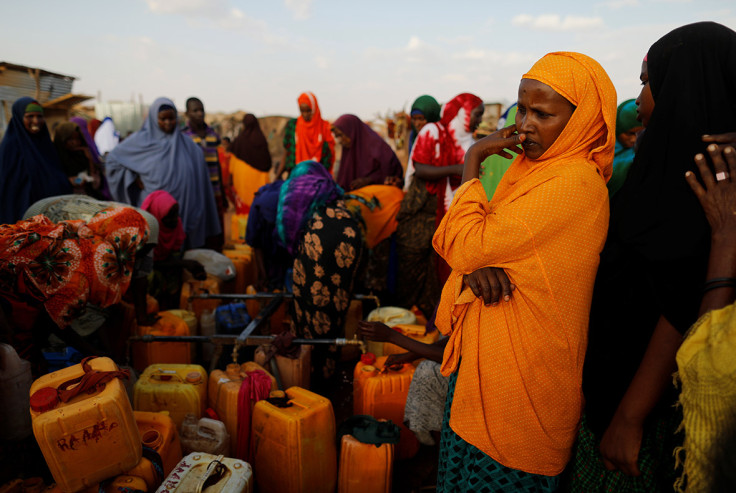Millions are on the brink of starvation in Somalia. It needs our urgent attention
Theresa May's Somalia conference is important but it cannot prioritise security over the impending famine.

Theresa May is hosting a major international conference in London to discuss the future of Somalia and address critical issues such as security, political reform, and economic development. There's been a lot of debate about the UK aid budget in recent weeks and this is a great example of why it matters so much.
While the longer term objectives of this summit are vital, we must not take our eye off the current crisis. Life-saving assistance is needed now for those affected by the drought.
In 2011 famine killed a staggering 260,000 people in Somalia, equivalent to the population of Hull or Milton Keynes. In 2017 the country stands on the brink of another catastrophe. Cases of malnutrition and diseases including cholera and measles are rising across the country resulting in an increasing death toll, particularly among children under five years of age.
The International Rescue Committee (IRC) welcomes the UK Government's bold effort of contributing £110m in critically-needed humanitarian funding for Somalia early in 2017. We encourage the UK to use the event of the conference to pledge further financing and encourage other donors to increase their pledges and ensure these turn into contributions.
In convening this conference, the UK has illustrated its global leadership and willingness to work towards solutions in the hardest and most challenging contexts. Central to the UK's continuing role in helping those most in need in Somalia and globally is its commitment to spending 0.7% of gross national income on overseas aid.
This money makes a critical and often life-saving difference to some of the world's most vulnerable people. It allows the government and its humanitarian partners to plan and deliver both the short and long-term responses needed to save lives, build people's self-reliance, and reduce their dependency on overseas assistance.
Somalia provides a clear example of why UK assistance and leadership is needed.
In response to the crisis, people are leaving rural areas in the hope they will receive aid elsewhere. In the week ending 14 April alone, 28,000 drought-related displacements were recorded by UNHCR - 33,000 new displacements were recorded the previous week. In total, over 600,000 people have been displaced since November.
Yet illegal checkpoints and extortion by armed groups are limiting the assistance that can get to affected areas. For those seeking assistance, particularly women and girls who are forced to cross illegal checkpoints, risks of robbery, rape, and assault are a daily threat.
The focus of the London conference on the Somali security sector is welcomed. As a first step, reductions in the numbers of troops and funding for the UN mission in Somalia must be reversed to protect civilians and the vital aid on which they rely.
The current rainy season is providing some relief in certain parts of the country but for most it is too little, too late. Crops have been destroyed. Livestock has been decimated. People's ability to provide for themselves has been severely compromised – these people need food, water, medical treatment and ultimately support to re-start their livelihoods.
Given the scale and severity of the drought, the humanitarian impact will invariably be felt for years to come. The recognition of the need for longer-term engagement in Somalia illustrated by this conference and the focus on economic development is welcomed.
Such investment must ensure people are able to mitigate against the worst effects of future droughts and assist Somalis to become more resilient and less reliant on foreign assistance.
The IRC in Somalia has been providing this type of support for many years including drought response through the provision of water, health and nutrition services and cash grants.
In the longer term, it is critical that investments are made in education to expand children's employment opportunities, and support to rehabilitate infrastructure such as water sources, essential for people to be able to continue their livelihoods during times of drought.
Such long-term interventions can also play an essential role in supporting the future return and reintegration of refugees.
There are around 880,000 Somali refugees living in East Africa region and Yemen. Currently, the severe food crisis means returns home are impossible. It is critical therefore that long-term plans for economic development in Somalia ensure assistance reaches both those who have remained and those who eventually choose to return.
It is almost unbelievable that in 2017 the world is facing not one but potentially four famines. The UK has always show and generosity in helping those most in need. The recent Disasters Emergency Appeal for East Africa has raised an impressive £55 million pounds in public donations.
Combined with government funding committed for the responses to crises in South Sudan, Nigeria and Yemen the UK is setting an example for other governments and illustrating what it means to be a truly Global Britain at a time when global leadership is needed the most.
© Copyright IBTimes 2025. All rights reserved.






















